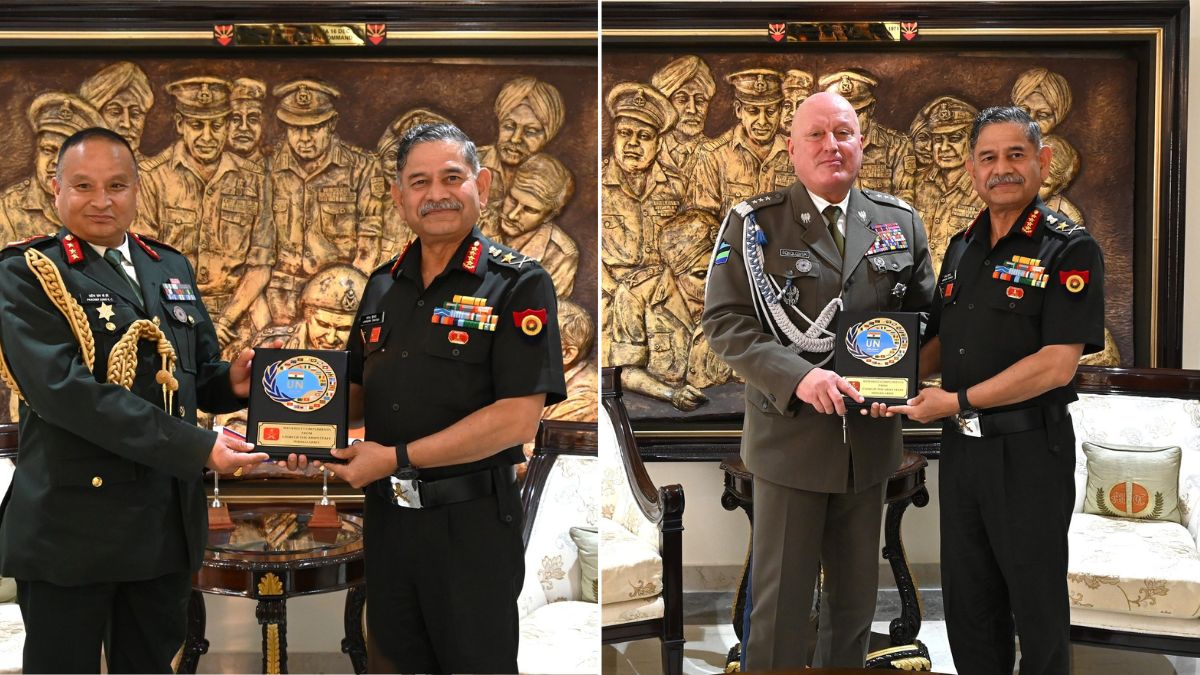Recently concluded UNTCC Chiefs’ Conclave 2025, hosted by the Indian Army, served a big platform for several high-level deliberations, solemn ceremonies and reaffirmation of collective resolve to strengthen United Nations peacekeeping operations. During the 3-day event, Chief of Army Staff General Upendra Dwivedi held many bilateral meetings.
General Dwivedi’s engagements also included those with his counterparts from Poland and Nepal, signalling India’s intent to deepen multilateral and regional defence partnerships. The conclave provided a platform for senior military leaders from major UN troop-contributing nations to discuss peacekeeping, interoperability and capacity building.
The discussions majorly centred on strengthening defence cooperation, enhancing interoperability and fostering closer coordination in future peacekeeping missions. These engagements reflected the Conclave’s overarching spirit of dialogue, partnership and shared commitment towards promoting global peace, stability and collective security.
COAS’ meeting with Polish Army chief: What was discussed?
Army Chief General Dwivedi met Polish Chief of the General Staff General Wiesław Kukuła on the sidelines of the 3-day conference in New Delhi. The two chiefs discussed avenues to strengthen defence cooperation, focusing on joint training, technology partnerships, and military-to-military exchanges.
Both sides acknowledged the growing importance of collaboration in emerging domains such as cyber defence, peacekeeping operations, and defence manufacturing. With Poland being a frontline NATO nation with strong defence industrial capabilities, the interaction is expected to pave the way for enhanced cooperation between the Indian Army and the Polish Armed Forces.
How did Nepal figure into the Army Chief’s diplomatic engagements?
In addition to his meeting with the Polish Chief, General Dwivedi also interacted with the Chief of the Nepal Army General Prabhu Ram Sharma. India and Nepal share a unique military relationship rooted in historical ties, recruitment links, and training cooperation.
Talks between the two sides centred on border security coordination, exchange of high-level visits, continued training of Nepalese officers in Indian military academies, and joint preparedness for humanitarian assistance and disaster relief (HADR).
Why are these meetings strategically important?
The bilateral engagements reflect India’s broader military diplomacy goals, which include reinforcing regional stability with neighbours like Nepal while simultaneously widening cooperation with European partners such as Poland. The discussions also support India’s stance as a leading troop contributor to UN peacekeeping missions and a proponent of multilateral military solutions.
Additionally, such high-level engagements also signal a dual-track strategy:
Neighbourhood First: Strengthening historic and operational ties with Nepal to maintain stability in the Himalayas.
European Engagement: Enhancing defence dialogue with Poland to tap into NATO-standard interoperability, defence R&D, and strategic partnerships.
India’s growing emphasis on capacity building, joint exercises, logistics cooperation, and peacekeeping leadership underlines its evolving role as a key security provider in both regional and global frameworks.
UNTCC 2025: Key takeaways from the UN peacekeeping conclave
The Conclave concluded with an unanimous affirmation that UN peacekeeping must adapt to new realities through: –
- Inclusive decision-making with a stronger voice for troop-contributing nations.
- Safeguard peacekeepers and ensure their safety through realistic mandates.
- Leveraging indigenous and cost-effective technologies for mission success.
- Enhanced interoperability and training frameworks to prepare troops for complex environments.
- Sustained partnerships rooted in trust, cooperation and shared responsibility.
